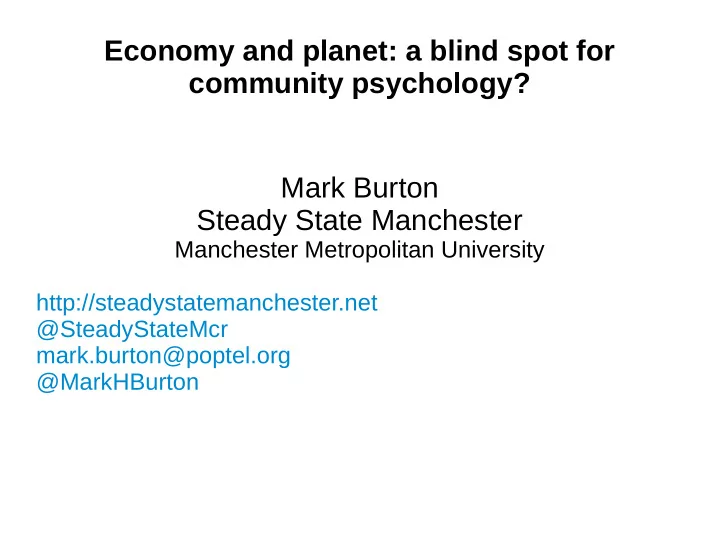

Economy and planet: a blind spot for community psychology? Mark Burton Steady State Manchester Manchester Metropolitan University http://steadystatemanchester.net @SteadyStateMcr mark.burton@poptel.org @MarkHBurton
Economics in revolt
Neoclassical economics – the fjrst cousin of traditional psychology 1) Methodological individualism : Socio-economic explanation must be sought at the level of the individual agent, in terms of their action, or agency Socio-economic explanation must move from agency to structure 2) Methodological instrumentalism: Behaviour is to be understood as a means for maximising preference- satisfaction. 3) Methodological equilibration: The central point of reference is “What behaviour should we expect in equilibrium?”. Whether an equilibrium is likely, is not questioned, the concern is with variations from the equilibrium and the tendency to return to that state. (Arnsperger & Varoufakis, 2006)
Neoclassical economics - consequences Practice of economics based on the rational, autonomous individual, making choices. Its conceptual models ignore the wider context of ecology and society . It ignores the collective dimension, and those aspects of human life (such as domestic work) that aren’t subject to monetary exchange. Its models were shown to be of staggering incompetence when the global economy tumbled – only a handful of economics professionals predicted the crash.
Planet and economy: community psychology's blind spot. Orthodox psychology also likes to build models based on the individual ● level, better if they are quantitative. It ignores the making of humans through their transactions in society via ● family, economy and community. It can be hopelessly irrelevant when confronted with the real challenges ● facing humanity – war, exploitation, ecological collapse. Much of this was said in the late 1960s and 1970s and that debate helped ● pave the way for both community social psychology and liberation psychology. But does Community Psychology have anything to say about the big global crises of our time? It has not generally engaged with the either the critique of economic thought, or the economic dimension of community.
Influences on community life Internal aspects of community Tradition and culture Social Policy Local politics Employment Costs and prices Scarcity versus abundance / security / Sovereignty - e.g. food Social, political, economic, ecological Community psychology has neglected the last two
Escaping the economy: community psychology and alternatives. Today's social, ecological and economic, ethical crises , result from pursuit of endless economic growth in a global economy, underpinned by capital accumulation / expropriation and the ever-increasing burning of fossil hydrocarbons. A dominant model: endless economic growth. - Incompatible with reduction of greenhouse gas emissions. - Requires new markets, new places to invest profits, new workforces, new sources of resources - but is stalled. - Has increased and masked inequalities - 'trickle down' hasn't happened.
Alternatives Critical responses The academy, e.g. work on alternative measures of economic social well- being, and ecological economics Social movements, e.g.North: decroissance / decrecemiento / degrowth and post-growth movements, transition towns, etc. South: ecologically orientated social and solidarity economy, de-colonial / vivir bien and peasant movements.
Potential contribution of Community Psychology 1. Articulation of another vision and model of social life – a true escape from the economy. 2. Contribution to the understanding of the institutional, ideological and social- psychological barriers to making fundamental changes to the global economic system. 3. Contribution to understanding the impacts of economic and ecological injustice on those most affected. 4. Assistance to activists and social movements fighting for economic and ecological justice. Insights from community psychology might help articulate alternative community- orientated values and provide conceptual and practical tools for counter- hegemonic social movements. But the path from community psychology praxis to social movement praxis is not obvious, and there are relatively few examples where this has occurred.
An Example
Our project - to articulate a post- growth economy and society in a municipal and regional context and build support for its proposals. We aim to make Steady State / post-growth part of everyday understanding - a new common sense.
Interventions and movement building > Publications > Commentary- blog, twitter etc. > Workshops, presentations, stalls. > Meeting with key people. > Working with allies Theory of action? -Build support for a counter- hegemonic model across sectors. -Appeal to people's values (e.g. social justice). -Colonise dominant discourse (e.g. good vs. bad growth) -Use evidence to establish validity of approach. -Create settings to explore ideas. -Maximise edge.
Successes > Taken seriously by local green and anti-poverty groups. > In dialogue with local politicians - working on 'next Generation (and dissatisfaction with current orthodoxy). Some proposals being adopted. > Some wider interest in the work (e.g.452 twitter followers). > Building up a core of people who can articulate Steady State thinking. > Working closely with influential groups and think tanks.
Problems > Policy, politics and discourse is 'locked in' to the orthodox model – the alternative is often met with incomprehension. > Small group fighting a hegemonic ideology. > So ideas get de-contextualised, distorted and then used to legitimate orthodox policy. > This extends to once radical counter-system movements (“austerity lite” and market mechanisms to counter climate change plus a return to 'growth').
Conclusion ● Community psychology has ignored the fundamental questions of planet and economy, that while macro-level in nature, impact on all levels from the the global to the personal. ● But it is possible to intervene “community psychologically” in local economies at municipal and regional levels. ● However, the dominant system is designed to resist these challenges in multiple ways. ● Our movements need to join together, learning from and supporting each other in the struggle for a better world, and for human survival itself.
Economy and planet: a blind spot for community psychology? Mark Burton Steady State Manchester Manchester Metropolitan University http://steadystatemanchester.net @SteadyStateMcr mark.burton@poptel.org @MarkHBurton
Recommend
More recommend